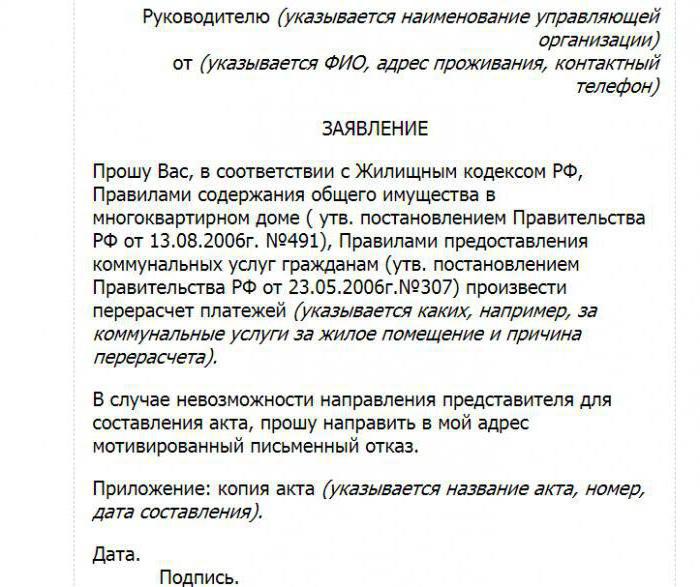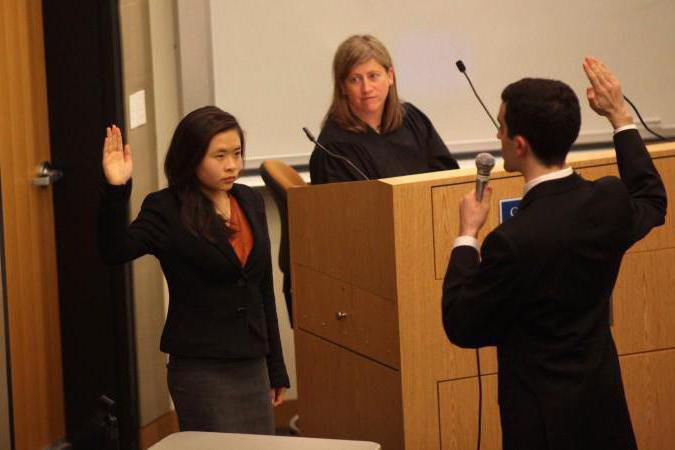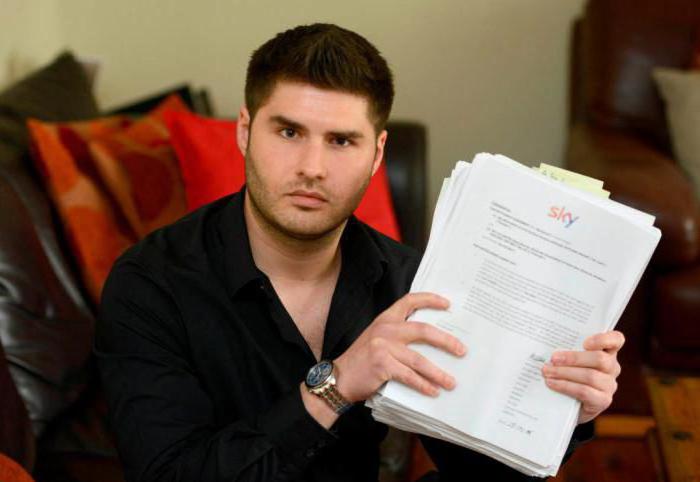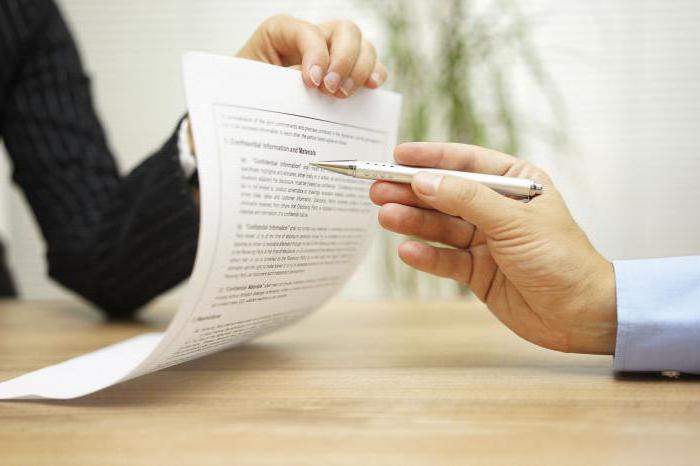An application for the recalculation of utilities is submitted by citizens who believe that they are being provided with them in the wrong quality or in the wrong volume. Despite the minimum level of requirements for the application, you should still consider a number of rules when writing it.
What services are we talking about?
The legislation provides for a minimum list of services that are the basis of a comfortable life. Well-established sewerage, heating in the cold season, electricity in the house make up a significant part of a comfortable life.
An application for the recalculation of utilities is submitted by a citizen if he believes that the company violates the rules for their provision. If his complaints are substantiated, then the company recalculates. This means that next month, the homeowner will pay a smaller amount or will not pay anything at all for some time.

Substantial overpayment makes the claim for collecting money from the company meaningful.
Recalculation can also be carried out by the supplier company if the user submitted incorrect readings or did not pay extra for the previous months. She has the right to conduct it without notice, the client will then receive a receipt indicating the amount of debt.
Legislative regulation
Before writing an application for the recalculation of utilities, the tenant needs to study a considerable list of regulations affecting this particular area:
- Housing Code.
- Civil Code.
- Rules for the provision of individual services (water, heating, gas, etc.), each service has its own regulatory document.
- Sanitary norms and rules.
The content of the application for the recalculation of utilities is not directly regulated by law. It is enough to know the general rules on citizens' appeals.
Is a contract obligatory
Formally, the law obliges the consumer and the contractor to sign an agreement in which their rights and obligations are established. The rules for the provision of each service provide for a model contract, and its provisions are required to adhere to all, without exception. It does not matter whether the company is in private or state (municipal) ownership.

It so happens that the signed agreement is missing. However, this fact does not deprive the owner or tenant of the right to apply for recalculation of utilities. The 2011 general public utility rules indicate that the first time the service is provided and accepted is considered the moment the agreement is concluded.
If the person living in the apartment is not the owner, he needs a power of attorney. The registration mark of the place of residence is not always accepted by company employees, which is not entirely legal. A person who officially uses housing has a full set of rights to provide communal services.
Grounds for application
Legislation provides several reasons for writing an application for recalculating utilities.
- excessive interruption in the provision of services due to an accident or repair;
- low quality of service (poor quality water, low room temperature, weak voltage in the network or, conversely, its excessive differences).
Who is to blame for the problem?
The quality of the service is influenced by the actions of both the provider and the person responsible for the maintenance of the house. The liability of the supplier organization ends at the place of the pipe insert into the house.In the case of electricity, there are several options for sharing responsibility for the network. Intra-home networks are the responsibility of either the management company or the HOA.

HOA - an organization created by the owners of apartments, it is engaged in servicing the common property of tenants, of which the house networks are part.
If the low quality of the services provided by a third-party company is to blame for the HOA (for example, the network is not in order), then the application for the recalculation of utility bills is not submitted. On the contrary, HOA is obliged to pay compensation to residents.
If the problem in the quality of HOA services is cleaning the house and the adjacent territory, repairing the structures of the house, an application for recalculation is submitted. Garbage collection is provided by specialized companies, an agreement is signed with each owner. Water, electricity, heating and gas supply are also the field of activity of specialized enterprises.
Who else is responsible for the allocation?
Authorities can create enterprises that are engaged in collecting evidence, settlements and sending out receipts for the services provided.

In some regions, utilities are not directly involved in this right now. Sometimes this practice is considered illegal by the courts, but the system does not change.
If a similar intermediary works in the village, then applications for recalculation should be addressed to him.
Where to go for help?
The supplier company is obliged to monitor the quality of the service provided, but in practice this does not happen. To prove their case, you have to contact expert organizations. Some of them are associated with consumer protection organizations. A sample application for recalculation of utility services can be found with them.

Specialists take measurements, take samples and otherwise collect material with which you can then substantiate the claim. Service providers, managing organizations, HOAs are doing everything to relieve themselves of responsibility: no one wants to lose the extra money. But, nevertheless, first of all it is necessary to turn to them with a complaint.
How to gather evidence?
If the company representative does not appear to call the tenant, neighbors can be invited as witnesses to draw up an act of violations.
In the case of heating, network representatives note in their acts that the temperature in the room is normal, deviations are insignificant. And then the help of experts will come in handy.

They will take measurements, draw up a conclusion, which will then be difficult to challenge.
This must be done systematically, so that later in court and other instances to prove the fact of improper performance by the supplier of their duties for a long time.
Likewise, evidence is gathered for an application to recalculate utilities for heating and electricity.
Evidence of problems with water supply and sanitation, in particular, are acts of flooding.
Drawing up schemes
An application for the arrival of a specialist must be submitted in writing or recorded in the telephone recording of conversations.
The complaint should specifically describe what kind of violations, according to the author, are.  The following describes how the measurement acts are compiled:
The following describes how the measurement acts are compiled:
- place (city, town), address;
- information about the participants in the preparation of the act (official certificate);
- carried out measurements, their method, information about the devices;
- signatures of participants, date of preparation of the document.
A copy is necessarily issued to the consumer.
A sample scheme of a sample application for recalculation of utilities contains the following points:
- name of company;
- information about the applicant (full name, where he lives);
- circumstances and grounds for recalculation (preferably referred);
- indicate for what period of time it is desirable to recalculate;
- signature and filing date;
- application (it lists copies of complaints, acts, expert opinions).
On a copy of any document handed in to the organization, you must ask to put a mark on the incoming number. This ensures that the application will not be accidentally lost somewhere.
The package of documents is single - whether an application is submitted to the HOA for the allocation of utilities or another organization does not matter. It is important not to make a mistake with the addressee.
Appeal to supervisory organizations
Housing authorities operate in each region. They are obliged to monitor the legitimacy of organizations and enterprises working in the housing sector. If the application for recalculation is refused, then you must contact the housing supervision. Copies of previously submitted documents and a response from the utility company are attached to the complaint. If there was no answer, it is enough to wait a month from the moment of sending the application to the company to write a complaint.
Housing supervision issues a binding order. If it is not executed, the guilty company is fined. Usually a fine is enough. If there is still no reaction, there is only one way out - the court.
Claim preparation
The claim for recalculation of utilities is considered according to the rules of civil proceedings. If the amount that the consumer asks to return is less than 50 thousand rubles, you should contact the magistrate's court. As a rule, it is this authority that examines all matters related to utilities.
We must not forget about the limitation period. If we are talking about the amount paid more than 3 years ago, the defendant has the right to declare the application of limitation of claims, and in this part the court will refuse to consider the case.
The law does not oblige the consumer to first contact all authorities, but the collected papers will facilitate the process of proving violations by the service provider.
The content of the lawsuit will be similar to the application for recalculation and a complaint to the housing inspectorate.
What does the suit look like?
What does the application for recalculation of utilities look like in court? This document includes the following items:
- name of court;
- information about the plaintiff (full name), address of location;
- name of the respondent’s organization, location address;
- circumstances that suggest that violations have occurred;
- substantiation (links to documents, examination materials, legislation);
- a request to the court (to oblige to recalculate for the specified period);
- application (description of attached documents or their copies);
- signature, filing date.
The number of copies is prepared according to the number of participants in the process.
An application to the court for the recalculation of utilities is not paid by the state fee upon filing. It is recovered from the losing side after the end of the process.